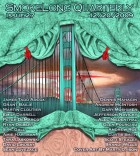There is so much about longing and trying to recover lost love in your wonderful story, “My Friend”, Gary. It is a moving piece that holds the reader tight. How did you find this story?
This story came from actual events, which is why I think it works. I couldn’t hide from it. It held me down by the throat and said, “Get this right. It hurts.”
The way you end “My Friend”, right there in the moment, there is an immediacy that leaves the reader hanging – hoping for the best. Can you talk about taking risks in writing?
I think if you didn’t take any risk, it wouldn’t be interesting. I always leave readers “hanging.” It leaves an ache, something irresistible. You have to go back to it and read it again. People at work hate my stories. They say, “So what happens?” I love that.
“My Friend” could be spoken word-for-word as a monologue… there is a wonderful character voice. Do you read your work out loud in the process of writing and revising?
Yes, I speak into one of those little recording gadgets. I sound like the Penguin. Sometimes I get choked up, especially with this story. A choking penguin.
Your narrator asks questions of his lost, invisible friend throughout the piece. Questioning creates its own rhythm. Can you talk about finding the music/rhythm while writing prose?
The rhythm in this story came naturally, so it’s like a song, a lament. I don’t plan these things. Most of the time I don’t know what I’m doing until it’s done and someone says, “That’s good the way you…” and I’m kind of like, “Uh, yeah.”
What writers inspire you?
Roddy Doyle, Henry Green, Donald Barthelme, not Cormac McCarthy, Carolyn Chute, Jonathan Foer, Flannery O’Connor, Maeve Brennan, Tony Earley, Dylan Thomas, and all the staff of SLQ. And Crispin Best.



 The core workshop of SmokeLong Fitness is all in writing, so you can take part from anywhere at anytime. We are excited about creating a supportive, consistent and structured environment for flash writers to work on their craft in a community. We are thrilled and proud to say that our workshop participants have won, placed, or been listed in every major flash competition. Community works.
The core workshop of SmokeLong Fitness is all in writing, so you can take part from anywhere at anytime. We are excited about creating a supportive, consistent and structured environment for flash writers to work on their craft in a community. We are thrilled and proud to say that our workshop participants have won, placed, or been listed in every major flash competition. Community works.